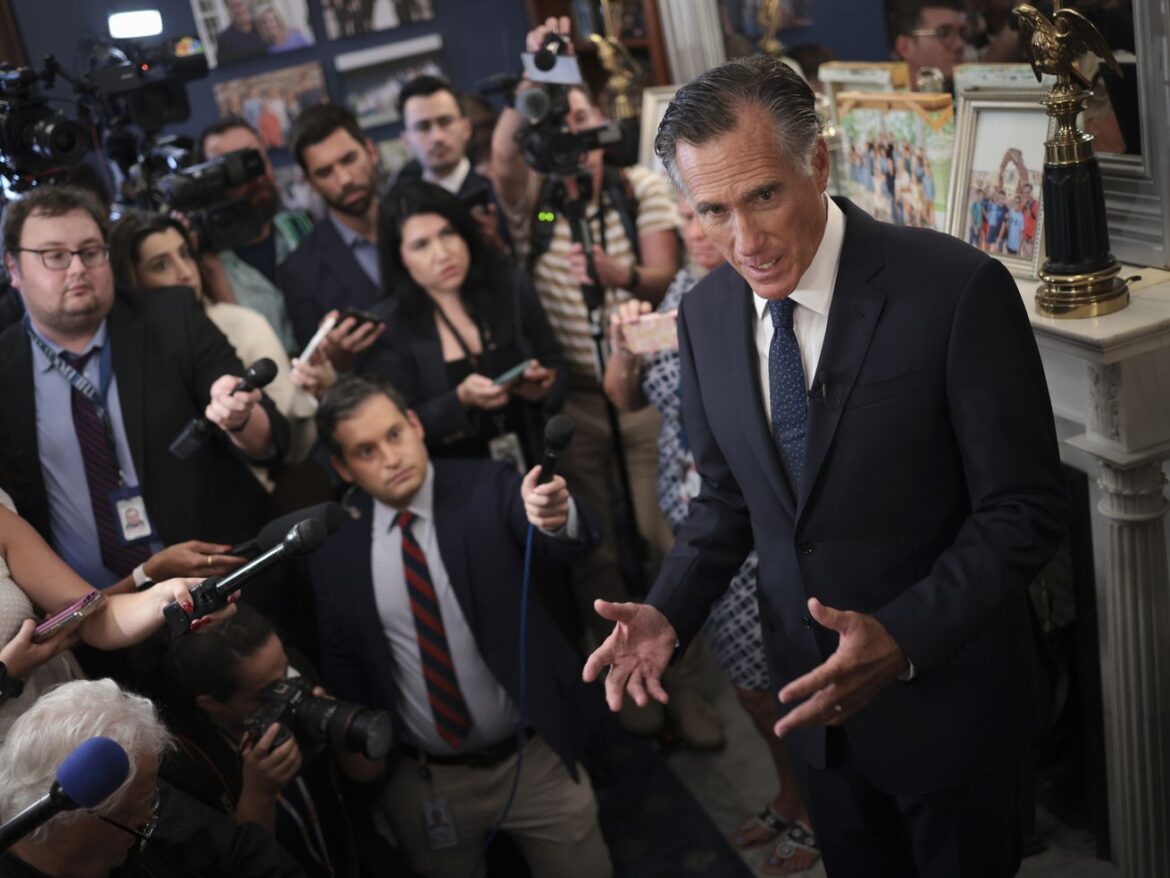Senate Republicans will be worse off without Romney in office.
On Wednesday, Sen. Mitt Romney (R-UT), a high-profile critic of former President Donald Trump, announced that he would retire after this term — a move that appears likely to shift the Senate GOP further to the right.
“It’s time for a new generation of leaders to … shape the world they’re going to live in,” Romney said in a video announcing his plans, during which he also criticized the leadership of both President Joe Biden and Trump. As part of his statement, Romney also emphasized that his age was a factor in this decision, noting that he would be in his mid-80s by the time he finished a second term.
Romney’s retirement, effective at the end of his current term in 2025, will mark the departure of one of the few GOP senators who’s been willing to directly confront Trump: He’s the only Republican who voted to convict Trump in both impeachment trials and was the first senator in history to vote to convict a president of his own party in 2020.
[Related: Mitt Romney just did something that literally no senator has ever done before]
Romney’s announcement also comes as Senate Republicans’ membership has shifted in a Trumpier direction in the last few years. This past year, six new Republicans were elected to the Senate, including four who previously subscribed to election denialism. With Romney’s departure, the Senate will lose both a key Republican moderate and dealmaker, along with a prominent lawmaker who was willing to call out the party’s likely 2024 presidential nominee.
Whoever takes over for him is likely to be both more conservative, and more Trump-friendly, a shift that could be especially concerning if the former president retakes power and few in his party are willing to check him.
Romney has been a key Trump critic
Romney’s legacy in politics is complicated.
A former Massachusetts governor and the GOP presidential nominee in 2012, Romney was best known for his background in private equity, his push for expanding health care as governor, and for his challenges connecting with voters on the presidential campaign trail. During campaign events, Romney’s comments — including viral remarks accusing “47 percent” of voters of being dependent on the government, and claims that he had “binders full of women” to choose from for administration jobs — often made him seem out of touch.
After the 2016 election, Romney also hailed Trump’s victory — despite vigorously criticizing him previously — as he sought consideration for the secretary of state job. And in the 2018 elections, Trump actually endorsed Romney for the Utah Senate seat despite the prior animus between the two politicians and reports that he had wanted Sen. Orrin Hatch to run to block Romney from the seat.
In 2017 and 2018, Romney criticized Trump intermittently, including when the former president claimed there were “very fine people” on both sides in the Charlottesville rally. And in 2019, Romney began to criticize Trump more aggressively and directly, including publishing a Washington Post op-ed that slammed the president’s lack of moral character. The hostility between the two only grew with the emergence of special counsel Robert Mueller’s investigation into Trump, and Romney’s vocal concerns about the findings in that review, which examined potential Russian interference in the 2016 election. This culminated in Trump suggesting that Romney should be impeached in October 2019, as detailed in a timeline by the Hill.
After all this, the two still maintained a veneer of diplomatic relations, though Romney’s February 2020 vote to convict Trump in his first impeachment trial marked a clear break.
In addition to his impeachment votes, Romney’s also taken vocal public stances condemning Trump for his election denialism and pushing back on his critiques of Black Lives Matter. He appears to level frequent and sharp criticisms at Trump — and his Senate colleagues for their allegiance to Trump — in a forthcoming book, in which he claims many in Congress agree with him about Trump, but are too afraid for their careers and personal safety to speak out.
It is true Romney has seen some electoral blowback for these positions: In a June 2023 Deseret News poll, 54 percent of Utah Republican voters said that he should not run again. And in an excerpt from the book published in the Atlantic, he claims to have, at one point, spent $5,000 on private security for his family in the wake of threats from Trump supporters.
Beyond his opposition to Trump, Romney is also known for being one of a dwindling handful of centrist Republican dealmakers. He’s been a part of important bipartisan coalitions like the group of lawmakers who helped approve the infrastructure bill, and that pushed through reforms to the Electoral Count Act intended to prevent a repeat of January 6. Romney was also one of a small number of Republicans who voted in favor of Supreme Court Justice Ketanji Brown Jackson’s confirmation, and who has urged a compromise on an expanded child tax credit.
He told McKay Coppins, author of the forthcoming biography, “There are about 20 senators here who do all the work, and there are about 80 who go along for the ride. … I want to do things.”
Despite a reputation for being one of the more bipartisan Republicans, he’s often taken typical conservative positions as well. Previously, Romney backed the confirmation of conservative Supreme Court Justice Amy Coney Barrett and has also cosponsored a 20-week abortion ban.
Romney’s replacement could be more conservative
Romney’s retirement is expected to spur a competitive Republican primary for his seat in 2024 and lead to a replacement who’s likely more conservative.
There are four candidates who’ve either signaled interest in the seat, or been rumored as possible contenders. These include Utah House Speaker Brad Wilson, former Rep. Jason Chaffetz, Rep. Blake Moore, and Trent Staggs, mayor of Riverton, Utah. Staggs is already in the race and boasts of endorsements from far-right internet personalities like Mark Levin and Charlie Kirk.
Across the board, the contenders are set to be to Romney’s right, and more deferential to Trump. Wilson has framed himself as a “conservative fighter,” Chaffetz, a former House Oversight chair, has criticized Trump’s indictments, Moore has previously declined to impeach Trump twice, and Staggs self-identifies as an “America First warrior.” Although Utah is a red state that’s been less enthusiastic about Trump compared to others, the former president still secured 58 percent of the vote there in 2020.
“I know the majority of Utahns are highly conservative and that we deserve, Utah deserves, another conservative senator,” Staggs previously told ABC News. “We’re not getting that in Mitt Romney.”
Any Romney successor would likely continue the trend the Senate has already seen — like with conservative Sens. Ted Budd and J.D. Vance replacing former Sens. Richard Burr and Rob Portman, respectively — with MAGA-friendly lawmakers replacing more moderate counterparts.



